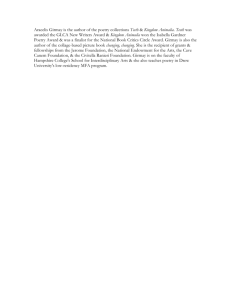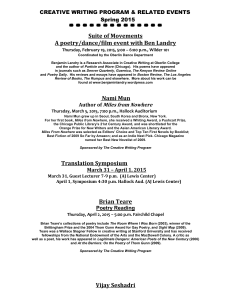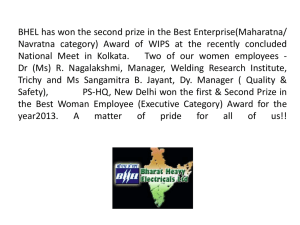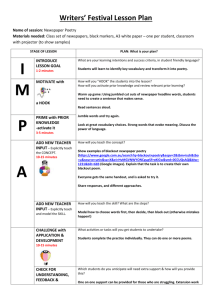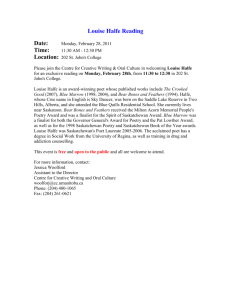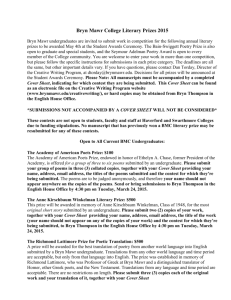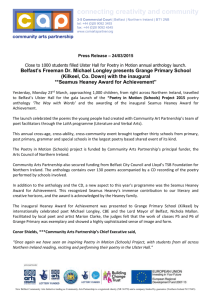poems - LagasYr13Eng
advertisement
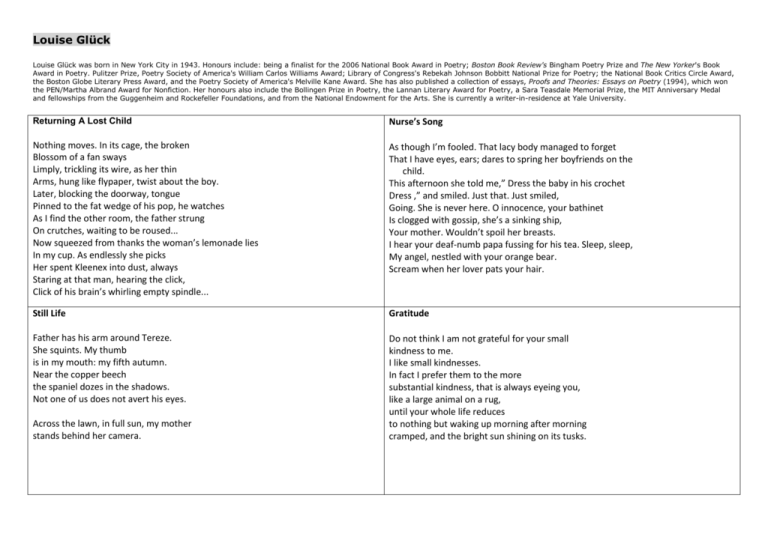
Louise Glück Louise Glück was born in New York City in 1943. Honours include: being a finalist for the 2006 National Book Award in Poetry; Boston Book Review's Bingham Poetry Prize and The New Yorker's Book Award in Poetry. Pulitzer Prize, Poetry Society of America's William Carlos Williams Award; Library of Congress's Rebekah Johnson Bobbitt National Prize for Poetry; the National Book Critics Circle Award, the Boston Globe Literary Press Award, and the Poetry Society of America's Melville Kane Award. She has also published a collection of essays, Proofs and Theories: Essays on Poetry (1994), which won the PEN/Martha Albrand Award for Nonfiction. Her honours also include the Bollingen Prize in Poetry, the Lannan Literary Award for Poetry, a Sara Teasdale Memorial Prize, the MIT Anniversary Medal and fellowships from the Guggenheim and Rockefeller Foundations, and from the National Endowment for the Arts. She is currently a writer-in-residence at Yale University. Returning A Lost Child Nurse’s Song Nothing moves. In its cage, the broken Blossom of a fan sways Limply, trickling its wire, as her thin Arms, hung like flypaper, twist about the boy. Later, blocking the doorway, tongue Pinned to the fat wedge of his pop, he watches As I find the other room, the father strung On crutches, waiting to be roused... Now squeezed from thanks the woman’s lemonade lies In my cup. As endlessly she picks Her spent Kleenex into dust, always Staring at that man, hearing the click, Click of his brain’s whirling empty spindle... As though I’m fooled. That lacy body managed to forget That I have eyes, ears; dares to spring her boyfriends on the child. This afternoon she told me,” Dress the baby in his crochet Dress ,” and smiled. Just that. Just smiled, Going. She is never here. O innocence, your bathinet Is clogged with gossip, she’s a sinking ship, Your mother. Wouldn’t spoil her breasts. I hear your deaf-numb papa fussing for his tea. Sleep, sleep, My angel, nestled with your orange bear. Scream when her lover pats your hair. Still Life Gratitude Father has his arm around Tereze. She squints. My thumb is in my mouth: my fifth autumn. Near the copper beech the spaniel dozes in the shadows. Not one of us does not avert his eyes. Do not think I am not grateful for your small kindness to me. I like small kindnesses. In fact I prefer them to the more substantial kindness, that is always eyeing you, like a large animal on a rug, until your whole life reduces to nothing but waking up morning after morning cramped, and the bright sun shining on its tusks. Across the lawn, in full sun, my mother stands behind her camera. Grandmother in the Garden Early December in Croton-on-Hudson The grass below the willow Of my daughter’s wash is curled With earthworms, and the world Is measured into row on row Of unspiced houses, painted to seem real. The drugged Long Island summer sun drains Pattern from those empty sleeves, beyond my grandson Squealing in his pen. I have survived my life. The yellow daylight lines the oak leaf And the wire vines melt with the unchanged changes Of the baby. My children have their husband’s hands. My husband’s framed, propped bald as a baby on their pianos, My tremendous man. I close my eyes. And all the clothes I have thrown out come back to me, the hollows Of my daughters’ slips...they drift; I see the sheer Summer cottons drift, equivalent to air. Spiked sun. The Hudson’s Whittled down by ice. I hear the bone dice Of blown gravel clicking. BonePale, the recent snow Fastens like fur to the river. Standstill. We were leaving to deliver Christmas presents when the tire blew Last year. Above the dead valves pines pared Down by a storm stood, limbs bared... I want you. Love Poem There is always something to be made of pain. Your mother knits. She turns out scarves in every shade of red. They were for Christmas, and they kept you warm while she married over and over, taking you along. How could it work, when all those years she stored her widowed heart as though the dead come back. No wonder you are the way you are, afraid of blood, your women like one brick wall after another.
